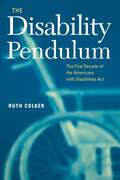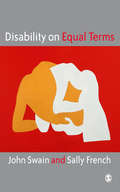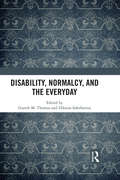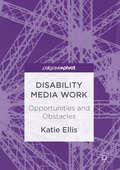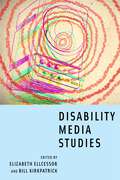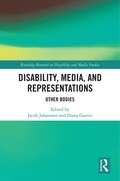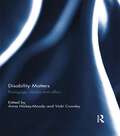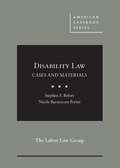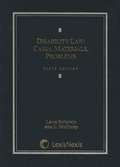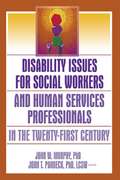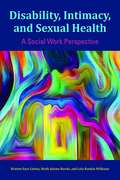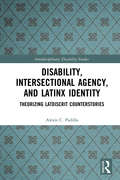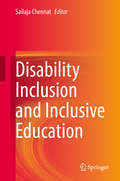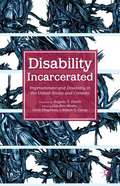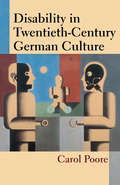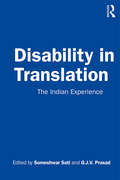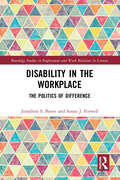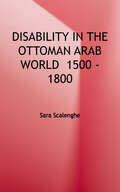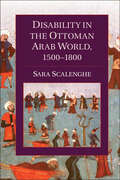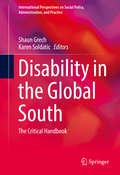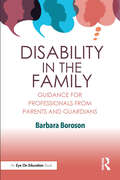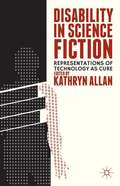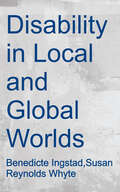- Table View
- List View
The Disability Pendulum: The First Decade of the Americans With Disabilities Act (Critical America Series) (Critical America #39)
by Ruth ColkerSigned into law in July 1990, the Americans with Disabilities Act (ADA) became effective two years later, and court decisions about the law began to multiply in the middle of the decade. In The Disability Pendulum, Ruth Colker presents the first legislative history of the enactment of the ADA in Congress and analyzes the first decade of judicial decisions under the act. She assesses the success and failure of the first ten years of litigation under the ADA, focusing on its three major titles: employment, public entities, and public accommodations.The Disability Pendulum argues that despite an initial atmosphere of bipartisan support with the expectation that the ADA would make a significant difference in the lives of individuals with disabilities, judicial decisions have not been consistent with Congress' intentions. The courts have operated like a pendulum, at times swinging to a pro-disabled plaintiff and then back again to a pro-defendant stance. Colker, whose work on the ADA has been cited by the Supreme Court, offers insightful and practical suggestions on where to amend the act to make it more effective in defending disability rights, and also explains judicial hostility toward enforcing the act.
Disability on Equal Terms
by John Swain Sally French'Disability on Equal Terms is not a Turgid and difficult book despite its accent on complex and challenging themes. It is a lively and important read' - The Skill Journal, June 2009 `[A] collection of highly readable and scholarly essays that reflect both the theoretical and practical implications of recent developments in the field. This book is essential reading for everyone interested in disability: highly recommended' - Colin Barnes, Centre for Disability Studies, University of Leeds This authoritative collection of writings examines and challenges traditional notions of disability. Edited and written by leading experts in the field, it offers a multidisciplinary approach to disability studies, incorporating perspectives from a wide range of health and social care services, as well as a distinct and unique emphasis on the views, experiences, work and personal testimonies of disabled people themselves. The book is divided into three sections, each of which is prefaced by an editorial introduction which brings together the key themes and issues under discussion. Each section: " Examines the dominant assumptions about disability and impairment and their historical and cultural contexts " Documents the challenges to such presumptions generated by disabled people themselves " Explores the implications of such challenges for professional policy and practice This ground-breaking book will be essential reading for those studying disability studies, social work, nursing, and allied health and social care at all levels. It will also be a thought-provoking and inspiring read for disabled people and activists, professionals and policy makers. John Swain is based in the School of Health, Community and Education Studies at Northumbria Univeristy. Sally French is based at the Open Univeristy. Previous publications include the co-edited Disabling Barriers, Enabling Environments, Second Edition (SAGE, 2004).
Disability, Normalcy, and the Everyday
by Dikaios Sakellariou Gareth M. ThomasMany critical analyses of disability address important ‘macro’ concerns, but are often far removed from an interactional and micro-level focus. Written by leading scholars in the field, and containing a range of theoretical and empirical contributions from around the world, this book focuses on the taken-for-granted, mundane human activities at the heart of how social life is reproduced, and how this impacts on the lives of those with a disability, family members, and other allies. It departs from earlier accounts by making sense of how disability is lived, mobilised, and enacted in everyday lives. Although broad in focus and navigating diverse social contexts, chapters are united by a concern with foregrounding micro, mundane moments for making sense of powerful discourses, practices, affects, relations, and world-making for disabled people and their allies. Using different examples – including learning disabilities, cerebral palsy, dementia, polio, and Parkinson’s disease – contributions move beyond a simplified narrow classification of disability which creates rigid categories of existence and denies bodily variation. Disability, Normalcy, and the Everyday should be considered essential reading for disability studies students and academics, as well as professionals involved in health and social care. With contributions located within new and familiar debates around embodiment, stigma, gender, identity, inequality, care, ethics, choice, materiality, youth, and representation, this book will be of interest to academics from different disciplinary backgrounds including sociology, anthropology, humanities, public health, allied health professions, science and technology studies, social work, and social policy.
Disability Media Work
by Katie EllisThis book interrogates trends in training and employment of people with disabilities in the media through an analysis of people with disabilities' self-representation in media employment. Improving disability representations in the media is vital to improving the social position of people with disability, and including people with lived experience of disability is integral to this process. While the media industry has changed significantly as a result of digital and participatory media, discriminatory attitudes around fear and pity continue to impact whether people with disability find work in the media. The book demonstrates no significant changes in attitudes towards employing disabled media workers since the 1990s when the last major research into this topic took place. By focusing on the employment of people with disability in media industries, Katie Ellis addresses a neglected area of media diversity, appealing to researchers in media and cultural studies as well as critical disability studies.
Disability Media Studies
by Elizabeth Ellcessor and Bill KirkpatrickIntroduces key ideas and offers a sense of the new frontiers and questions in the emerging field of disability media studies Disability Media Studies articulates the formation of a new field of study, based in the rich traditions of media, cultural, and disability studies. Necessarily interdisciplinary and diverse, this collection weaves together work from scholars from a variety of disciplinary homes, into a broader conversation about exploring media artifacts in relation to disability. The book provides a comprehensive overview for anyone interested in the study of disability and media today. Case studies include familiar contemporary examples—such as Iron Man 3, Lady Gaga, and Oscar Pistorius—as well as historical media, independent disability media, reality television, and media technologies. The contributors consider disability representation, the role of media in forming cultural assumptions about ability, the construction of disability via media technologies, and how disabled audiences respond to particular media artifacts. The volume concludes with afterwords from two different perspectives on the field—one by disability scholar Rachel Adams, the other by media scholars Mara Mills and Jonathan Sterne—that reflect upon the collection, the ongoing conversations, and the future of disability media studies. Disability Media Studies is a crucial text for those interested in this flourishing field, and will pave the way for a greater understanding of disability media studies and its critical concepts and conversations.
Disability, Media, and Representations: Other Bodies (Routledge Research in Disability and Media Studies)
by Jacob Johanssen Diana GarrisiBringing together scholars from around the world to research the intersection between media and disability, this edited collection aims to offer an interdisciplinary exploration and critique of print, broadcast and online representations of physical and mental impairments. Drawing on a wide range of case studies addressing how people can be ‘othered’ in contemporary media, the chapters focus on analyses of hateful discourses about disability on Reddit, news coverage of disability and education, media access of individuals with disabilities, the logic of memes and brain tumour on Twitter, celebrity and Down Syndrome on Instagram, disability in TV drama, the metaphor of disability for the nation; as well as an autoethnography of treatment of breast cancer. Providing a much-needed global perspective, Disability, Media, and Representations examines the relationship between self-representation and representations in either reinforcing or debunking myths around disability, and ways in which academic discourse can be differently articulated to study the relationship between media and disability. This book will be of interest to students and researchers of disability studies and media studies as well as activists and readers engaged in debates on diversity, inclusivity and the media.
Disability, Media, and Representations: Other Bodies (Routledge Research in Disability and Media Studies)
by Jacob Johanssen Diana GarrisiBringing together scholars from around the world to research the intersection between media and disability, this edited collection aims to offer an interdisciplinary exploration and critique of print, broadcast and online representations of physical and mental impairments.Drawing on a wide range of case studies addressing how people can be ‘othered’ in contemporary media, the chapters focus on analyses of hateful discourses about disability on Reddit, news coverage of disability and education, media access of individuals with disabilities, the logic of memes and brain tumour on Twitter, celebrity and Down Syndrome on Instagram, disability in TV drama, the metaphor of disability for the nation; as well as an autoethnography of treatment of breast cancer. Providing a much-needed global perspective, Disability, Media, and Representations examines the relationship between self-representation and representations in either reinforcing or debunking myths around disability, and ways in which academic discourse can be differently articulated to study the relationship between media and disability. This book will be of interest to students and researchers of disability studies and media studies as well as activists and readers engaged in debates on diversity, inclusivity and the media.
Disability Matters: Pedagogy, media and affect
by Anna Hickey-Moody Vicki CrowleyFrom the critique of ‘the medical model’ of disability undertaken during the early and mid-1990s, a ‘social model’ emerged, particularly in the caring professions and those trying to shape policy and practice for people with disability. In education and schooling, it was a period of cementing inclusive practices and the ‘integration’ and inclusion of disability into ‘mainstream’. What was lacking in the debates around the social model, however, were the challenges to abledness that were being grappled with in the routine and pragmatics of self-care by people with disabilities, their families, carers and caseworkers. Outside the academy, new forms of activity and new questions were circulating. Challenges to abledness flourished in the arts and constituted the lived experience of many disability activists. Disability Matters engages with the cultural politics of the body, exploring this fascinating and dynamic topic through the arts, teaching, research and varied encounters with ‘disability’ ranging from the very personal to the professional. Chapters in this collection are drawn from scholars responding in various registers and contexts to questions of disability, pedagogy, affect, sensation and education. Questions of embodiment, affect and disability are woven throughout these contributions, and the diverse ways in which these concepts appear emphasize both the utility of these ideas and the timeliness of their application. This book was originally published as a special issue of Discourse: Studies in the Cultural Politics of Education.
Disability Law: Cases And Materials (American Casebook Series)
by Stephen Befort Nicole PorterThis casebook covers disability discrimination under the Americans with Disabilities Act and special education under the Individuals with Disabilities Education Act. It includes statutory text and court decisions in the areas of employment, government services, public accommodations, and education. The casebook incorporates a substantial number of cases decided after the enactment of the ADA Amendments Act. This casebook has a greater focus on employment issues than other casebooks and could support either a stand-alone disability discrimination in employment course or a broad-based disability law course. Each chapter contains streamlined notes and questions designed to provoke thoughtful class discussion.
Disability Law: Cases, Materials, Problems (Fifth Edition)
by Laura F. Rothstein Ann C. McginleyDisability Law: Cases, Materials, Problems takes a broad approach to understanding how disability discrimination laws apply to the kinds of cases attorneys, policymakers, and judges are likely to face. The new Fifth Edition adds analysis and discussion of the ADA Amendments Act throughout the book. It reorganizes and adds new cases and materials in the employment law chapter, including cases on harassment and retaliation based on disability. It also pays more attention to procedural issues (burden of proof), remedies and defenses, litigation and dispute resolution, and insurance. It adds a problem-based approach with chapters and sections of chapters beginning with a hypothetical scenario to be used as a basis for applying the substantive law. It also adds expanded Notes at the end of each section.
Disability Issues for Social Workers and Human Services Professionals in the Twenty-First Century
by Jean A Pardeck John W MurphyExamine issues of vital importance to you and your disabled clients-today and in the years to come!This groundbreaking text provides you with up-to-date, authoritative information that will prove to be of critical importance for disability professionals in the coming years. It will leave you better informed about aspects of disability that have not been well covered in the literature-issues surrounding spirituality, civil rights, and the "medical model vs. social (or minority) model" (of viewing disability) controversy. You&’ll examine the impact of the Americans with Disabilities Act in the wake of the Supreme Court&’s narrowing of the Act&’s powers and explore newly developed theories designed to more accurately define the true meaning of disability.Disability Issues for Social Workers and Human Services Professionals in the Twenty-First Century explores: the current-and potential-roles of spirituality and religion in the rehabilitation process the use of medication in treating disability-with a study focusing on children in foster care whose emotional/behavioral disabilities are medically (rather than psychologically) treated Attention-Deficit/Hyperactivity Disorder (ADHD) in college students-how it impacts them as a disability requiring academic accommodations disability as an aspect of cultural diversity-with suggested methods for educating the non-disabled about people with disabilities limitations on the civil rights of those with disabilities-and what can be done to eliminate those limitations computer technologies designed to aid people with disabilities-with an examination of a health promotion Web site for children with disabilities and their families disability and the managed mental health system-with an examination of the differences in service utilization and satisfaction in rural and urban areas how disability can be viewed as a social construct, rather than something that is inherent to the disabled personKeeping current with new developments is imperative for social workers and other professionals whose work affects people with disabilities. Disability Issues for Social Workers and Human Services Professionals in the Twenty-First Century provides the information you need to stay on the cutting edge of progress in this rapidly evolving field.
Disability, Intimacy, and Sexual Health: A Social Work Perspective
by Kristen Faye Linton Heidi Adams Rueda Lela Rankin Williams"Sexuality is a key aspect of human development and identity, yet people with disabilities frequently encounter social and political barriers to achieving healthy, autonomous intimate relationships. Society tends to associate disability with asexuality and often labels sexual behaviors among people with disabilities as problematic or deviant. Faced with these assumptions and resultant policies, how can social workers meet the needs of this diverse population across the life course? In this book, Linton, Adams Rueda, and Rankin Williams compile comprehensive research and candid interviews with social workers to explore the complicated intersection of disability and sexuality. The book begins by detailing historical violations of the sexual and reproductive rights of people with disabilities, including forced castration and sterilization. It then explores current issues of sexuality and disability throughout the life course, starting with childhood and adolescence. The authors examine the increased risk of abuse and victimization that people with disabilities face while in romantic or sexual relationships and provide practice recommendations to help combat factors that contribute to this vulnerability. Other milestones across the life course are also explored, such as pregnancy and parenting, marriage and cohabitation, and intimacy in older adulthood. Throughout the book, the authors examine the micro, meso, and macro systems that affect the lives and relationships of people with disabilities. This book touches on psychiatric, intellectual, developmental, learning, neurological, and physical disabilities and gives voice to both practitioners and their clients. It's an unflinching look at the pressing challenges professionals can face while serving people with disabilities, essential for students, academics, policymakers, and practitioners in a variety of settings who wish to advocate for the full sexual citizenship of people with disabilities"--The publisher.
Disability, Intersectional Agency, and Latinx Identity: Theorizing LatDisCrit Counterstories (Interdisciplinary Disability Studies)
by Alexis PadillaThis interdisciplinary volume links dis/ability and agency by exploring LatDisCrit’s theory and activist emancipatory practice. It uses the author’s experiential and analytical views as a blind brown Latinx engaged scholar and activist from the global south living and struggling in the highly racialized global north context of the United States. LatDisCrit integrates critically LatCrit and DisCrit which look at the interplay of race/ethnicity, diasporic cultures, historical sociopolitics and disability within multiple Latinx identities in mostly global north contexts, while incorporating global south epistemologies. Using intersectional analysis of key concepts through critical counterstories, following critical race theory methodological traditions, and engaging possible decoloniality treatments of material precarity and agency, this book emphasizes intersectionality’s complex underpinnings within and beyond Latinidades. Through a careful interplay of dis/ability identity and dis/ability rights/empowerment, the volume opens avenues for intersectional solidarity and spaces for radical transformational learning. This book will be of interest to all scholars and students working in disability studies; intersectional disability justice activists; critical Latinx/Chicanx studies; critical geographies; intersectional political philosophy; and political and public sociology.
Disability Inclusion and Inclusive Education
by Sailaja ChennatThe book approaches the topic of disability, inclusion and inclusive education in a holistic way including both academic and psycho-social perspectives. It also focuses on the contemporary status of disability studies with a multidisciplinary dimension. The experiences and challenges of children with disabilities and the different dimensions of inclusive education have been situated appropriately by including at the outset, a chapter on 'Disability Studies: The Context'. Chapter on 'Sociology of Disability' accentuates the tone and perspective of the presentations of the authors and editor. The research findings presented in the book indicate grounded realities and suggestions for transactional strategies which are plausible in the Indian context. It has never been timely to publish a book that helps professionals who work with schools, special education teachers, and counsellors to analyze disabilities from a socio-psychological perspective keeping the protagonist at the centre. Case narrations situated in the Indian context enrich the presentations giving voice to the marginalized children/adults with disabilities. This work serves as a comprehensive reference for the most prevalent disabilities at school education level covering the conceptual understanding about each disability, their psycho-social perspectives, implications for classroom transactions, suggestions of transactional strategies along with a brief explanation of assistive technology that can be used in case of each disability.With Right to Education Act (2009) in place, a diverse range of readers, from special educators and other teachers in schools, prospective teachers pursuing their pre service teacher education programmes, teacher educators and researchers in the field of disabilities and inclusive education will all find this volume useful, as a reference material with long shelf life.
Disability Incarcerated
by Liat Ben-Moshe Chris Chapman Allison C. CareyDisability Incarcerated gathers thirteen contributions from an impressive array of fields. Taken together, these essays assert that a complex understanding of disability is crucial to an understanding of incarceration, and that we must expand what has come to be called 'incarceration. ' The chapters in this book examine a host of sites, such as prisons, institutions for people with developmental disabilities, psychiatric hospitals, treatment centers, special education, detention centers, and group homes; explore why various sites should be understood as incarceration; and discuss the causes and effects of these sites historically and currently. This volume includes a preface by Professor Angela Y. Davis and an afterword by Professor Robert McRuer.
Disability in Twentieth-Century German Culture
by Carol PooreDisability in Twentieth-Century German Culture covers the entire scope of Germany's most tragic and tumultuous century---from the Weimar Republic to the current administration---revealing how central the notion of disability is to modern German cultural history. By examining a wide range of literary and visual depictions of disability, Carol Poore explores the contradictions of a nation renowned for its social services programs yet notorious for its history of compulsory sterilization and eugenic dogma. This comprehensive volume focuses particular attention on the horrors of the Nazi era, when those with disabilities were considered "unworthy of life," but also investigates other previously overlooked topics including the exile community's response to disability, socialism and disability in East Germany, current bioethical debates, and the rise and gains of Germany's disability rights movement. Richly illustrated, wide-ranging, and accessible, Disability in Twentieth-Century German Culture gives all those interested in disability studies, German studies, visual culture, Nazi history, and bioethics the opportunity to explore controversial questions of individuality, normalcy, citizenship, and morality. The book concludes with a memoir of the author's experiences in Germany as a person with a disability.
Disability in Translation: The Indian Experience
by Someshwar Sati G.J.V. PrasadThis volume explores how disability is seen, written about, read and understood through literature and translation. Foregrounding the asymmetrical world of power relations, it delves into the act of translation to exhibit how disability is constructed and deployed in language and culture. The essays in the volume reflect and theorise on experiences of translating various Indian-language stories (into English) which have disability as their subject. They focus on recovering and empowering marginal voices, as well as on the mechanics of translating idioms of disability. Furthermore, the book goes on to engage the reader to demonstrate how disability, and the space it occupies in our lives, can be reinforced or deconstructed in translation. A major intervention in translation and disability studies, this volume will be of great interest to scholars and researchers of literature, culture, and sociology.
Disability in the Workplace: The Politics of Difference (Routledge Studies in Employment and Work Relations in Context)
by Jonathon S. Breen Susan J. ForwellThis book introduces the difference model of disability. Framed within an affect-based understanding of the relationships between those living with impairments and others, this new model offers a reconsideration of the construct of disability itself. Disability is flexible, relational, and perceived through an acognitive lens. At a practice level, the difference model offers a framework for creating more positive and successful relationships between people with disabilities (PWDs) and others within the workplace. This includes two new tools, the Co-Worker Acceptance of Disabled Employees (CADE) Scale and the Perceived Barriers to Employing Persons with Disabilities (PBED) Scale. Designed to measure workplace attitudes, and changes to these attitudes, each of these scales provides empirical evidence in support of strategic planning and, ultimately, an increased representation of PWDs. Finally, this book considers the effects of language and technology on workplace attitudes toward disability.
Disability in the Ottoman Arab World, 1500-1800 (Cambridge Studies in Islamic Civilization Ser.)
by Sara ScalenghePhysical, sensory, and mental impairments can influence an individual's status in society as much as the more familiar categories of gender, class, religion, race, and ethnicity. This was especially true of the early modern Arab Ottoman world, where being judged able or disabled impacted every aspect of a person's life, including performance of religious ritual, marriage, job opportunities, and the ability to buy and sell property. Sara Scalenghe's book is the first on the history of both physical and mental disabilities in the Middle East and North Africa, and the first to examine disability in the non-Western world before the nineteenth century. Unlike previous scholarly works that examine disability as discussed in religious texts such as the Qur'an and the Hadith, this study focuses on representations and classifications of disability and impairment across a wide range of biographical, legal, medical, and divinatory primary sources.
Disability in the Ottoman Arab World, 1500-1800 (Cambridge Studies in Islamic Civilization)
by Sara ScalenghePhysical, sensory, and mental impairments can influence an individual's status in society as much as the more familiar categories of gender, class, religion, race, and ethnicity. This was especially true of the early modern Arab Ottoman world, where being judged able or disabled impacted every aspect of a person's life, including performance of religious ritual, marriage, job opportunities, and the ability to buy and sell property. Sara Scalenghe's book is the first on the history of both physical and mental disabilities in the Middle East and North Africa, and the first to examine disability in the non-Western world before the nineteenth century. Unlike previous scholarly works that examine disability as discussed in religious texts such as the Qur'an and the Hadith, this study focuses on representations and classifications of disability and impairment across a wide range of biographical, legal, medical, and divinatory primary sources.
Disability in the Global South
by Shaun Grech Karen SoldaticThis first-of-its kind volume spans the breadth of disability research and practice specifically focusing on the global South. Established and emerging scholars alongside advocates adopt a critical and interdisciplinary stance to probe, challenge and shift common held social understandings of disability in established discourses, epistemologies and practices, including those in prominent areas such as global health, disability studies and international development. Motivated by decolonizing approaches, contributors carefully weave the lived and embodied experiences of disabled people, families and communities through contextual, cultural, spatial, racial, economic, identity and geopolitical complexities and heterogeneities. Dispatches from Ghana, Lebanon, Sri Lanka, Cambodia, Venezuela among many others spotlight the complex uncertainties of modern geopolitics of coloniality; emergent forms of governance including neoliberal globalization, war and conflicts; the interstices of gender, race, ethnicity, space and religion; structural barriers to redistribution and realization of rights; and processes of disability representation. This handbook examines in rigorous depth, established practices and discourses in disability including those on development, rights, policies and practices, opening a space for critical debate on hegemonic and often unquestioned terrains. Highlights of the coverage include: Critical issues in conceptualizing disability across cultures The challenges of disability statistics. Colonialism and disability Disability and poverty: critical renegotiations Livelihoods and disability: the complexities of labouring in the global South. Intersectional terrains, including migration, race, ethnicity, and customary embodiedness Disability and Religion Violence against disabled women in the global South: working locally, acting globally. Disability-inclusive disaster risk reduction The UNCRPD and critical orientations towards disability rights within various contextual settings Redistribution systems including disability inclusive budgeting, social security regimes and social policy measures Global South-North partnerships: intercultural methodologies in disability research. This much awaited handbook provides students, academics, practitioners and policymakers with an authoritative framework for critical thinking and debate about disability, while pushing theoretical and practical frontiers in unprecedented ways.
Disability in the Family: Guidance for Professionals from Parents and Guardians
by Barbara BorosonThis insightful guide shows professionals how to collaborate with parents and guardians of children with disabilities in empathic, respectful, knowledgeable, and supportive ways. Packed with first-hand accounts and advice from parents and guardians, this book shines a light on lived experiences and reveals paths toward meeting families where they are in order to move forward together. Boroson emphasizes that appreciating the real needs of these families is a crucial step beyond mere adherence to a generic set of professional best practices or principles. Whether working in the field of medicine, education, law, mental health, or related services—in any capacity—readers will come away with the holistic knowledge, inclusive language, productive strategies, and differentiated understanding needed to work effectively with the diverse families they serve. Included is a robust array of resources for families, such as books, articles, associations, organizations, and support networks, along with a website for additional, up-to-date resources.
Disability in Science Fiction
by Kathryn AllanIn this groundbreaking collection, twelve international scholars - with backgrounds in disability studies, English and world literature, classics, and history - discuss the representation of dis/ability, medical "cures," technology, and the body in science fiction.
Disability in Local and Global Worlds
by Benedicte Ingstad Susan Reynolds WhyteThe lives of many disabled people in Europe and North America have improved over the past two decades through innovative technologies and the efforts of the disability rights movement. These changes have been spreading to other societies around the globe―albeit unevenly. In this collection of essays, leading scholars explore global changes in disability awareness, technology, and policy from the viewpoint of disabled people and their families in a wide range of local contexts. The authors report on ethnographic research in Brazil, Uganda, Botswana, Somalia, Britain, Israel, China, Egypt, India, and Japan. They address the definition of disability, the new eugenics, human rights in local contexts, domestic and state citizenship of disabled people, and issues of identity and belonging.
Disability in Judaism, Christianity, and Islam
by Darla Schumm Michael StoltzfusThis edited collection of essays critically examines how diverse religions of the world represent, understand, theologize, theorize and respond to disability and/or chronic illness. Contributors employ a wide variety of methodological approaches including ethnography, historical, cultural, or textual analysis, personal narrative, and theological/philosophical investigation.
